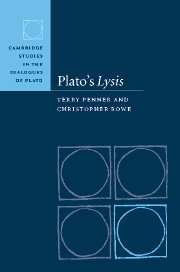Book contents
- Frontmatter
- Contents
- Preface
- PART I AN ANALYSIS OF THE LYSIS
- 1 203a1–207b7: the cast assembles, and the main conversation is set up
- 2 207b8–210d8 (Socrates and Lysis): do Lysis' parents really love him?
- 3 210e1–213c9: Socrates and Menexenus – how does one get a friend?
- 4 213d1–216b9: Socrates and Lysis again, then Menexenus – poets and cosmologists on what is friend of what (like of like; or opposite of opposite?)
- 5 216c1–221d6: what it is that loves, what it really loves, and why
- 6 221d6–222b2: the main argument reaches its conclusion
- 7 222b3–e7: some further questions from Socrates about the argument, leading to (apparent) impasse
- 8 223a1–b8: the dialogue ends – people will say that Socrates and the boys think they are friends, but that they haven't been able to discover what ‘the friend’ is
- 9 203a1–207b7 revisited
- PART II THE THEORY OF THE LYSIS
- Epilogue
- Translation of the Lysis
- Bibliography
- Index of names
- Index of subjects
6 - 221d6–222b2: the main argument reaches its conclusion
Published online by Cambridge University Press: 22 September 2009
- Frontmatter
- Contents
- Preface
- PART I AN ANALYSIS OF THE LYSIS
- 1 203a1–207b7: the cast assembles, and the main conversation is set up
- 2 207b8–210d8 (Socrates and Lysis): do Lysis' parents really love him?
- 3 210e1–213c9: Socrates and Menexenus – how does one get a friend?
- 4 213d1–216b9: Socrates and Lysis again, then Menexenus – poets and cosmologists on what is friend of what (like of like; or opposite of opposite?)
- 5 216c1–221d6: what it is that loves, what it really loves, and why
- 6 221d6–222b2: the main argument reaches its conclusion
- 7 222b3–e7: some further questions from Socrates about the argument, leading to (apparent) impasse
- 8 223a1–b8: the dialogue ends – people will say that Socrates and the boys think they are friends, but that they haven't been able to discover what ‘the friend’ is
- 9 203a1–207b7 revisited
- PART II THE THEORY OF THE LYSIS
- Epilogue
- Translation of the Lysis
- Bibliography
- Index of names
- Index of subjects
Summary
In this, the final part of the main argument, Socrates draws some threads together before reaching a conclusion (though in the immediate sequel, 222b3–e7, he will make the conclusion seem to be in doubt): that ‘[i]t's necessary … for the genuine lover, one who's not pretended, to be loved by his darling’ (222a6–7). Quite what this amounts to, and how it relates to the argument so far, may be as opaque, at first reading, as it evidently is to Menexenus, and to Lysis. But on our analysis, it is a natural outcome of the argument of the Lysis up to the present point.
The short passage in question may for convenience be divided up into two movements, though the division is more than usually artificial. The passage has some markedly strange features, which are accounted for by a partial change of register, from full seriousness to a certain mixture of the serious and the playful – largely caused by the fact that Socrates will simultaneously (a) reach his conclusion, (b) appear to give Hippothales what he wants, and (c) leave Lysis and Menexenus in differing degrees of uncertainty as to what, precisely, they have agreed to, even while they have plainly come some of the way with him.
221d6–e5: IS THE OBJECT OF PHILIA WHAT BELONGS (TO OIKEION)?
‘But,’ I said, ‘what desires, desires whatever it's 221e1 lacking. Isn't that so?’
‘Yes.’
‘And what is lacking, in that case (ara), is friend of whatever it's lacking?’
‘It seems so to me. […]
- Type
- Chapter
- Information
- Plato's Lysis , pp. 157 - 172Publisher: Cambridge University PressPrint publication year: 2005



